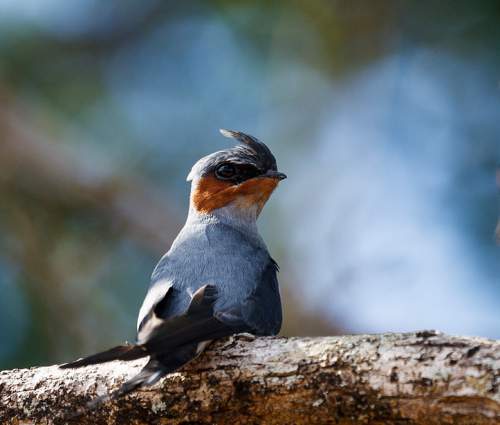The crested treeswift (Hemiprocne coronata) is classified under the family of treeswifts, Hemiprocnidae, under the order Apodiformes. These treeswift species are distributed in India, Sri Lanka, Nepal, Bangladesh, Bhutan, Myanmar, South China, Vietnam, Laos, Cambodia and Thailand. Apart from perching, having small legs with limited function is a characteristic of the species under the order Apodiformes. The crested treeswift species are highly aerial birds and are closely related to swifts.
Taxonomy of Crested treeswift
- Scientific Name: Hemiprocne coronata
- Common Name: Crested treeswift
- French: Hémiprocné couronné, German: Kronenbaumsegler, Spanish: Vencejo arborícola coronado;
- Other names: Hirundo Coronata Tickell, 1833;
- Family: Hemiprocnidae › Apodiformes › Aves › Chordata › Animalia
- Species author: (Tickell, 1833)
Description
The crested treeswift is a small, slender, aerial bird, measuring about 20 to 25 cm in length. They are glossy bluish gray on the upper side and whitish on the underside. The female is slightly paler than the male. They have an erectile forehead crest. The gray bill is short with a wide gape. The long swept-back wings are a darker gray and when perched the wing-tips are crossed. The deeply forked tail is white on the underside. The adult male has brownish orange coloration on the sides of the face and the chin. The lores are black. Their call is a raptor-like, sharp kee-kyew sound. |
| Indian birds -Crested treeswift - Hemiprocne coronata |
 |
| Birds of India - Crested treeswift - Hemiprocne coronata |
 |
| Indian birds - Crested treeswift - Hemiprocne coronata |
 |
| Birds of India - Crested treeswift - Hemiprocne coronata |
Distribution
The crested treeswift is a common resident bird in the Indian subcontinent. However, they are rarely seen in the central India and the east coast. They are resident in Yunnan province in southern China, Myanmar, Vietnam, Laos, Cambodia and Thailand.Ecosystem and habitat
These crested treeswift species inhabit open woodland and deciduous forests. They are also found in scattered trees, groves, parks and gardens.Diet and feeding habits
These crested treeswifts are insectivorous, aerial birds and catch most of their prey while flying. Their diet mostly consists of bees, wasps, ants, termites, flies and beetles. The treeswifts intermittently dart out from their perch to catch airborne insects and also glean insects from foliage. They have been found to drink by flying near the surface of water and pick insects from the surface of water.Reproduction and breeding
The breeding season of these treeswift species is between December and April in India. There may be local variations depending upon the seasonal conditions. These treeswifts have been recorded to copulate both in-flight as well as on perch. The nest is small and is glued by saliva to the exposed branch of a tree. A single egg is laid and both the parents take turns to incubate. Both male and female provide parental care of the hatchling.Movement and migration patterns
The crested treeswift species are resident birds. They may make local movements for feeding and breeding. Dispersal movements have been observed after the breeding season.Conservation status and concerns
The global population of these treeswift species has not been quantified. The overall population trend is considered to be stable. It has extremely large range and hence considered not "Vulnerable" to extinction.The IUCN (International Union for Conservation of Nature) has categorized and evaluated these crested treeswift species and has listed them as of "Least Concern".
Image author: Thimindu Goonatillake | CC BY-SA 2.0 (as on 2016-11-04)
2.Image source: https://www.flickr.com/photos/thimindu/5927196390/
Image author: Thimindu Goonatillake | CC BY-SA 2.0 (as on 2016-11-04)
3.Image source: https://www.flickr.com/photos/kookr/4536047999/
Image author: David Cook | CC BY-NC 2.0 (as on 2016-11-04)
Current topic in Birds of India: Crested treeswift - Hemiprocne coronata.
